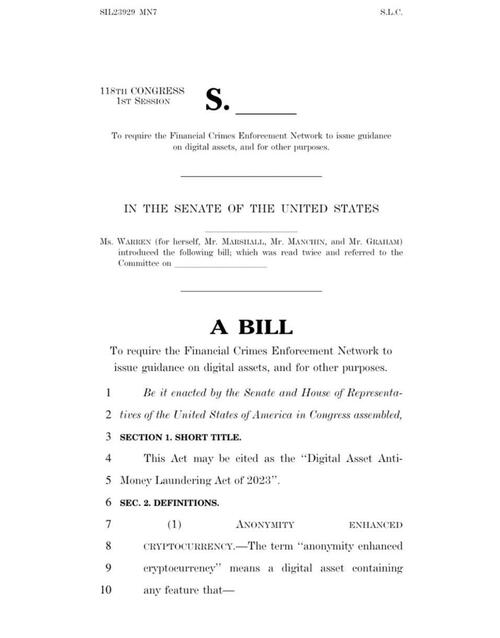Authored by J.W.Verret via CoinTelegraph.com,
Warren’s Digital Asset Anti-Money Laundering Act would shut crypto providers down, playing into the hands of the banking industry...
It seems that every time Massachusetts Senator Elizabeth Warren fails to get an anti-crypto bill passed, she introduces a new draft. She has the strategy of messaging bills — legislation introduced for the purposes of media attention and fundraising more than actual passage — down to a science.
Warren’s latest legislation, the Digital Asset Anti-Money Laundering Act, threatens to undermine crypto’s core principles of freedom and personal sovereignty. While Warren argues that her bill is necessary to combat illicit activities, a closer look reveals its potential to stifle innovation, endanger user privacy and play right into the hands of big banks.
The bill, co-sponsored by Kansas Senator Roger Marshall, is based on the premise that digital assets are increasingly being used for criminal activities such as money laundering, ransomware attacks and terrorist financing. While some bad actors exploit digital assets, the bill’s approach of treating all developers and wallet providers as potential criminals is not only impractical but also dangerous.
The most dangerous part of the bill is the requirement that digital asset developers comply with Bank Secrecy Act (BSA) responsibilities and Know Your Customer (KYC) requirements. This effectively places the burden of law enforcement on the shoulders of software developers. It’s akin to requiring car manufacturers to be responsible for how their vehicles are used on the road.
The Digital Asset Anti-Money Laundering Act of 2023
The bill further seeks to eliminate privacy tools that protect crypto users from malicious actors. By cracking down on digital asset mixers and anonymity-enhancing technologies, Warren’s proposal threatens the privacy rights of law-abiding citizens. It’s essential to remember that privacy is a fundamental right, not a privilege that can be discarded at will. A number of early Bitcoin millionaires have been kidnapped and tortured as a direct result of the transparency of the Bitcoin blockchain. Warren would leave future Bitcoiners defenseless against such threats.
While she claims to be acting in the name of national security, it’s worth noting that the big banks would benefit greatly from limiting the competition posed by cryptocurrencies. By imposing onerous regulations, the bill would make it difficult for crypto to compete on a level playing field.
But what about the argument that digital assets are being used by rogue nations and criminal organizations? While this is a valid concern, it’s crucial to distinguish between the technology itself and the actions of a few. The same argument could be applied to cash, which has been used for illegal activities for centuries. Banning cash would be an overreaction, just as overly restrictive crypto regulations are.
One major concern is the bill’s approach to “unhosted” digital wallets, which allow individuals to bypass Anti-Money Laundering (AML) and sanctions checks. While preventing illicit transactions is crucial, the bill’s proposed rule to require banks and money service businesses to verify customer identities and file reports on certain transactions involving unhosted wallets may have unintended consequences.
Forcing individuals to provide personal information for every transaction goes against the very principles that have drawn people to cryptocurrencies — privacy and pseudonymity. It’s important to strike a balance between security and individual rights. Overregulation could drive users away from regulated platforms, pushing them into unregulated, more challenging-to-track environments.
Additionally, the bill’s focus on directing the United States Financial Crimes Enforcement Network to issue guidance on mitigating the risks of handling anonymized digital assets seems to misunderstand the core tenets of blockchain technology. Cryptocurrencies like Bitcoin are designed to be transparent yet pseudonymous. Trying to eliminate this pseudonymity jeopardizes one of the key features that make blockchain secure and appealing to users.
Another significant issue is the potential overreach in extending BSA rules to include digital assets. Requiring individuals engaged in transactions over $10,000 in digital assets through offshore accounts to file a Report of Foreign Bank and Financial Accounts (FBAR) may be excessive. It could result in unnecessary burdens on individuals who use digital assets for legitimate purposes, such as cross-border remittances or investments.
Warren’s bill is a sledgehammer approach to a nuanced problem. Rather than stifling innovation and privacy, a more balanced approach would be to target specific criminal activities and individuals. The current AML system, which large crypto exchanges comply with, has been effective at interdicting illicit crypto usage, which is why isolated instances have been reported.
The Digital Asset Anti-Money Laundering Act is a deeply flawed piece of legislation. Warren’s bill poses a real threat to the crypto community and risks playing right into the hands of big banks. It’s essential that we find a more balanced and effective solution that addresses the concerns without stifling the potential of this transformative technology.

